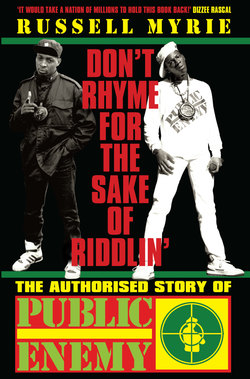Читать книгу Don't Rhyme For The Sake of Riddlin' - Russell Myrie - Страница 9
На сайте Литреса книга снята с продажи.
Оглавление4
Still on the Come-up
Essentially for the future of Public Enemy, Spectrum City’s show on WBAU allowed them a glimpse of how the business side of hip-hop was developing. Their close proximity to Queens also proved to be important when it came to their relationship with Run DMC, a group which achieved so many firsts for hip-hop. The late, and immeasurably great, Jam Master Jay in particular would prove to be crucial in the PE story.
It was Bill Stephney who hooked everyone up. He had a connection with Russell ‘Rush’ Simmons, who was the group’s manager, Run’s brother and head of Rush Communications. As well as recalling the nickname Russell had had for a number of years, Rush Communications was a budding conglomerate. Simmons, who had already been involved in the careers of early rap stars such as Kurtis Blow, was well on his way to becoming hip-hop’s first mogul.
Bill Stephney had the honour of conducting Run DMC’s first ever radio interview, and this gave him an insight into how Russell, Run DMC and Jay were doing what they did. About four weeks after the Spectrum crew received what is rumoured to be the first ever copy of Run DMC’s breakthrough hit ‘Sucker MCs’ a very young Run, DMC and Jam Master Jay passed through WBAU on their way to future glory. As they were yet to enjoy even their first hit, the Kings from Queens were nervous. They were uncharacteristically quiet and reserved but nevertheless very happy to be there and happy that they were making their way in the industry.
After another visit or two they relaxed and began to open up. The Spectrum crew were always big fans. When ‘Sucker MCs’ was being primed for release, Chuck and Hank were able to get an early copy from Run DMC’s record company Profile through the record pool (a loose collection of DJs who received promos from record companies and swapped information about music) they were a part of. These were the days before hip-hop’s power became undeniable and when it was widely considered to be a fad that would end in the same way as disco and punk: fallen by the wayside. Disgusted fans of genres ranging from rock to classical music derided hip-hop for many reasons. Rappers didn’t play real instruments (failing to recognise both the innovative way hip-hop turned the turntable into an instrument and practices like beatboxing), they didn’t see the value of ‘talking’ on records (they obviously couldn’t see that rapping is the ultimate manifestation of the ancient African oral tradition) and where was the melody? To many, hip-hop wasn’t ‘real music’. It’s easy to see who had the last laugh.
‘Not everybody wanted to be a hip-hop DJ. It wasn’t a prestigious thing in the record pool,’ says Chuck. ‘If you were a hip-hop DJ they’d be like…’ He mimics someone being brushed off by a disinterested third party. As hip-hop DJs, Chuck and Hank were at the bottom of their record pool’s list of priorities. A lot of club owners also felt this way, so only a few hip-hop records at most would be played at your average club night.
This didn’t matter to Chuck and Hank. They weren’t as short-sighted as the other DJs and club owners and were more than happy to take the hip-hop records. As the years passed the amount of hip-hop records with which to form a playlist was increasing considerably. In the early eighties, funk and r’n’b began to take a back seat. But the people who ran the record pool were slow to catch on. As a result, Chuck and Hank’s dedication meant they would often actually be buying records to play on their show. The record pool wasn’t up to the times.
Run DMC’s demeanour was very different to that which the WBAU family had encountered with the handful of rappers who had been successful during the Sugar Hill era spawned by ‘Rapper’s Delight’. Run DMC ended that earlier style of rap with their stripped-down beats, street clothes and, most important of all, their harder style of emceeing. Their good attitude only made the WBAU crew all the more keen to promote them. From that point any record that came from the Rush camp would automatically get played.
